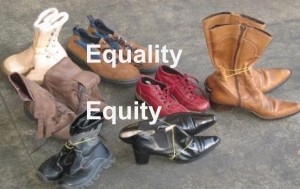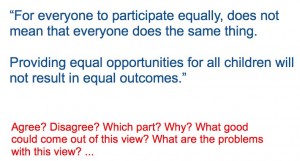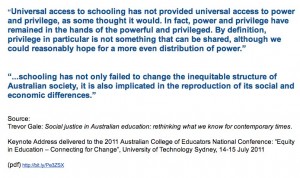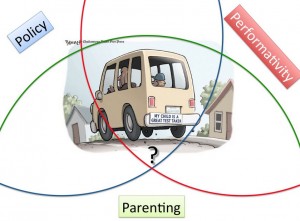You’ll have to blame Tony Loughland and Barry Manilow for that awfully punsy, a touch sexist and inappropriate title. But there is a little bit in it. The crying part.
As a PhD student scraping for every dollar I am one of the tutors in a unit called Understanding Teachers’ Work here at my alma mater Murdoch University. I run workshops for the first year pre-service teachers. Intro-to-teaching 101. The range of topic is great, understandably, and the idea of the unit is for students to recognise the complexity of this great profession of ours. Today, the topic was, roughly, understanding the diversity, dealing with parents/communities and issues of equity and social justice. Much to pack into two hours huh? To top it all off – I was running late on my prep so I demonstrated the time-honoured skill of winging it a bit.
The mantra in this unit has been: Ask questions! Of yourself, peers and beyond. And boy oh boy – we had a cracker!
I don’t want to bore you with the finer mechanics of activities but a few key links and rough outline will help.
First, we came up with a massive cloud of diversity and challenges students, teachers, parents and entire communities operate with daily. We listened to a story of the newly opened Jarjum College for Indigenous kids in Redfern (I heard it on the way to uni, half an hour before workshop kickoff … teachable moment 🙂 )

One student asked: But how is that fair to have a school JUST for Aboriginal kids? I’m sure they want to be integrated not separated from the society?
There goes 10 minutes of heated and quite thoughtful discussion, suggesting a bunch of work in unpacking the context and histories of the area and the Australian Indigenous cultures.
We sailed into ‘safe, white waters’ and I thought I’d flash this oft shown picture and quote.

“OK, we all chuckle and nod in approval but … why? And just what are the alternatives? What would a different exam for everyone look like? Feasible? Practical? Desirable? Are we just used to our idea of ‘an exam’? …” and so on. Gold!
It was time to pull appart equality and equity. The two are often stuck together with such massive implications. So we did ‘the shoes‘, as described here by Lara David so well.
Short and sweet. Pennies dropped. I sensed many.
“And we want all to participate, right. Is that enough? What do you make of this?”
“OK, folks. You and me go into this thing called education to make a difference. I overheard it your discussions and we talked a bit about what that means and the differences in understanding among people last week. That’s great! We are here to make a difference. But do we? At what level? Consider this…” (flashed a few key quotes from Trevor Gale’s speech)
“So does the school system reproduce or re-construct society?” Another curvy one there. Much to talk about, think about, reflect on in students (graded, yes) journals for the unit.
Conversations, debates, voices, gestures as I walk around the room and eavesdrop and poke here and there.
“OK, so we want justice and equity. How do we do that? How do we get them? How do we get people to understand say … prejudice in the first place? Really understand it?”
Here is one possible way. Please do not do exactly this at home…
Brown Eyes/ Blue Eyes – Intro by P. Zimbardo
5 minutes left … “There’s another video that shows Jane Elliot more in depth with the kids. Goes for about 15 minutes. Show it?” Nods, nods, nods
And the tears? There were a few during and at the end of the workshop. I was honoured to see them, without pointing them out.
Yeah sure, we packed an ENORMOUS amount of stuff in here and covered a huge amount of ground very lightly. It borders irresponsible. But I do look forward to reading the students’ reflection journals. Today, the conversations, the questions (and the tears…) made me happy that we are about to send out another group of keen, thoughtful educators out there where stuff that matters hugely – happens.











